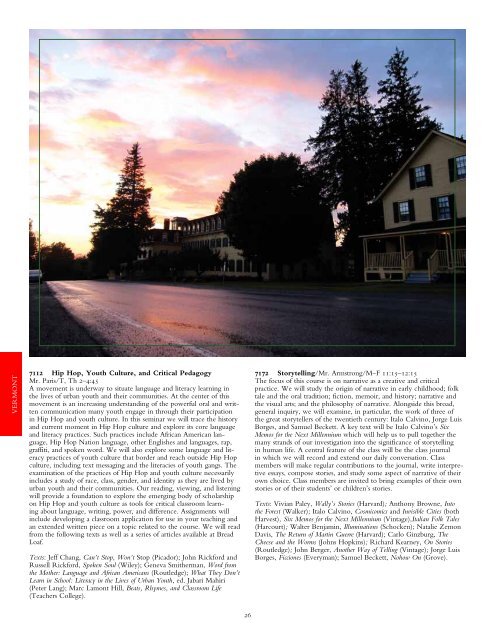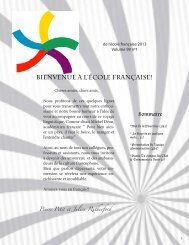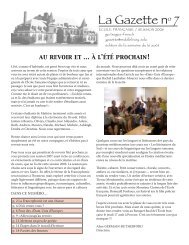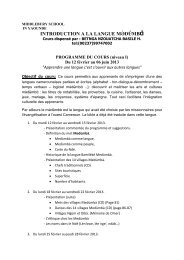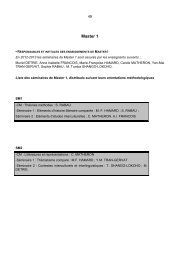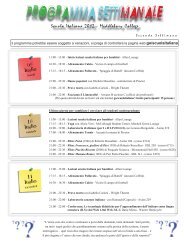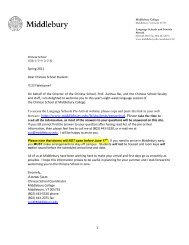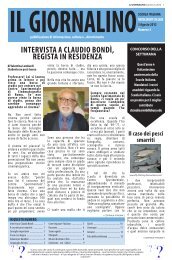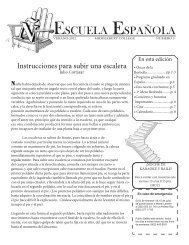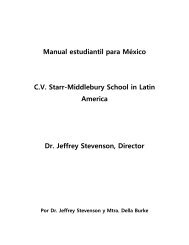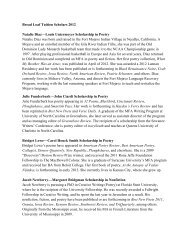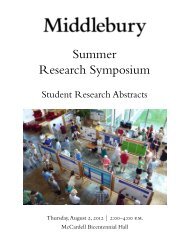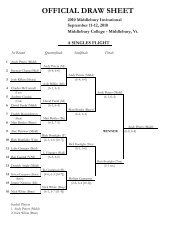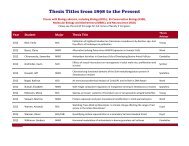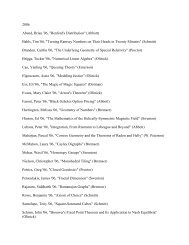2010 Catalog - Middlebury College
2010 Catalog - Middlebury College
2010 Catalog - Middlebury College
Create successful ePaper yourself
Turn your PDF publications into a flip-book with our unique Google optimized e-Paper software.
VERMONT<br />
7112 Hip Hop, Youth Culture, and Critical Pedagogy<br />
Mr. Paris/T, Th 2–4:45<br />
A movement is underway to situate language and literacy learning in<br />
the lives of urban youth and their communities. At the center of this<br />
movement is an increasing understanding of the powerful oral and written<br />
communication many youth engage in through their participation<br />
in Hip Hop and youth culture. In this seminar we will trace the history<br />
and current moment in Hip Hop culture and explore its core language<br />
and literacy practices. Such practices include African American language,<br />
Hip Hop Nation language, other Englishes and languages, rap,<br />
graffiti, and spoken word. We will also explore some language and literacy<br />
practices of youth culture that border and reach outside Hip Hop<br />
culture, including text messaging and the literacies of youth gangs. The<br />
examination of the practices of Hip Hop and youth culture necessarily<br />
includes a study of race, class, gender, and identity as they are lived by<br />
urban youth and their communities. Our reading, viewing, and listening<br />
will provide a foundation to explore the emerging body of scholarship<br />
on Hip Hop and youth culture as tools for critical classroom learning<br />
about language, writing, power, and difference. Assignments will<br />
include developing a classroom application for use in your teaching and<br />
an extended written piece on a topic related to the course. We will read<br />
from the following texts as well as a series of articles available at Bread<br />
Loaf.<br />
Texts: Jeff Chang, Can’t Stop, Won’t Stop (Picador); John Rickford and<br />
Russell Rickford, Spoken Soul (Wiley); Geneva Smitherman, Word from<br />
the Mother: Language and African Americans (Routledge); What They Don’t<br />
Learn in School: Literacy in the Lives of Urban Youth, ed. Jabari Mahiri<br />
(Peter Lang); Marc Lamont Hill, Beats, Rhymes, and Classroom Life<br />
(Teachers <strong>College</strong>).<br />
26<br />
7172 Storytelling/Mr. Armstrong/M–F 11:15–12:15<br />
The focus of this course is on narrative as a creative and critical<br />
practice. We will study the origin of narrative in early childhood; folk<br />
tale and the oral tradition; fiction, memoir, and history; narrative and<br />
the visual arts; and the philosophy of narrative. Alongside this broad,<br />
general inquiry, we will examine, in particular, the work of three of<br />
the great storytellers of the twentieth century: Italo Calvino, Jorge Luis<br />
Borges, and Samuel Beckett. A key text will be Italo Calvino’s Six<br />
Memos for the Next Millennium which will help us to pull together the<br />
many strands of our investigation into the significance of storytelling<br />
in human life. A central feature of the class will be the class journal<br />
in which we will record and extend our daily conversation. Class<br />
members will make regular contributions to the journal, write interpretive<br />
essays, compose stories, and study some aspect of narrative of their<br />
own choice. Class members are invited to bring examples of their own<br />
stories or of their students’ or children’s stories.<br />
Texts: Vivian Paley, Wally’s Stories (Harvard); Anthony Browne, Into<br />
the Forest (Walker); Italo Calvino, Cosmicomics and Invisible Cities (both<br />
Harvest), Six Memos for the Next Millennium (Vintage),Italian Folk Tales<br />
(Harcourt); Walter Benjamin, Illuminations (Schocken); Natalie Zemon<br />
Davis, The Return of Martin Guerre (Harvard); Carlo Ginzburg, The<br />
Cheese and the Worms (Johns Hopkins); Richard Kearney, On Stories<br />
(Routledge); John Berger, Another Way of Telling (Vintage); Jorge Luis<br />
Borges, Ficciones (Everyman); Samuel Beckett, Nohow On (Grove).<br />
–


